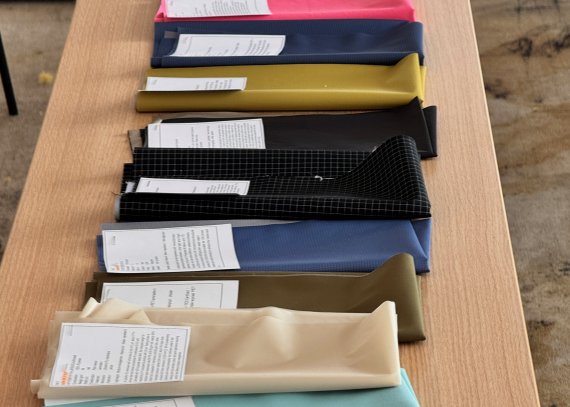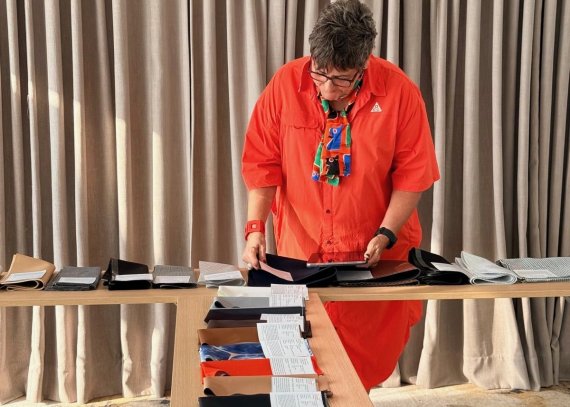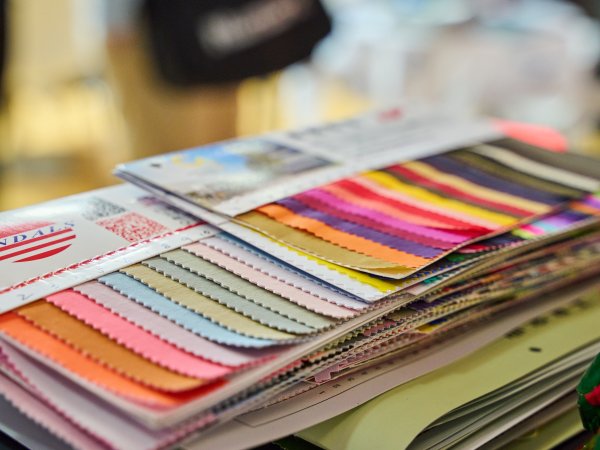The ISPO Textrends jury, comprising international textile experts, convened once again to discuss, deliberate, and examine the material applications for Fall/Winter 2027/28. With eight categories, including base layer, second layer, outer layer, membranes and coatings, street sports, fibers and insulation, trims and accessories, the judging process was split over two days, not in the traditional Munich setting, but this time on the French Riviera.
They say a change is as good as a rest, and the sea air certainly gave the jury a refreshing approach, but it didn't change the cross-sharing of knowledge and know-how, with every jury member coming from a different sector of the textile industry.
What can we expect from the newly designed Textrends forum at ISPO 2025? Overall, a lot of innovation is combined with sustainability embedded within the textile chain. The jury found it reassuring that the textile industry recognizes the importance of sustainability, but it can’t be the unique selling point of performance fabrics.
Information is key as transparency and traceability are crucial to the role of new legislation, including the digital product passport. However, while certifications do count, they aren’t finite; additional data is needed to prove that the claims actually function. Giusy Bettoni, CEO & Founder, C.L.A.S.S, explained
You can see the fact that things are evolving; it's a surprise to see how they develop. For example, this time I've seen a significant evolution, first of all, in presenting the evidence to support the data we are discussing. It's about measurement, not just certification, because you know the two things are entirely different.
Materials, from an aesthetic point of view, highlighted the potential for progress in developing fabrics with a little more texture, allowing for fashion crossover. This all leads to a more efficient use for the consumer, as they require less apparel for multiple purposes. Sophie Bramel, Technical Editor, Sports Textiles, highlighted
The suiting fabrics, there's that urban tech trend, which is making a comeback. We saw a lot of fabrics that could work, which have that crossover quality-sports performance. Street aesthetics, so that was cool. I like that. Yeah, I like that. I think people want their clothes to do more for them. That's an exciting thing: you don't need a wardrobe for everything. And most people are not extreme.
Bettoni had also noted
This season the application of these fabrics is much broader than you know, a normal into bracket regular. Because there is no normal, in sports, sportswear, or active sports, I've seen a lot of performance that can apply to my everyday life. And this is so evident for me, especially in the knit.
Then find out how ISPO brings together the most creative pioneering brands from sportswear, street and outdoor lifestyle and creates space in which real innovation is born.
Sometimes less is more, and once again a big shoutout to the unsung heroes, the spinners who are engineering exquisite yarns, that enable the mills to create these high-performance fabrics. In both the synthetic and natural sides, that was a degree of hybrid blends, a push towards recycled ocean plastic, textile-to-textile commercial developments, and the reemergence of silk in blends. Thomas Häkansson, Creative Director/Senior Designer mentioned
With the knowledge and techniques we have today, we can avoid too complicated constructions. I can also see some innovations in membranes. In the finer yarn count. I see some good examples of very lightweight, tightly constructed recycled yarns in super lightweight, which everybody in the industry claims is challenging the standard of recycled yarns, so that is promising a lot.

What was clear was that there wasn’t as big a divide as in the past between naturals and synthetics. The message was much more harmonious: we are all in this together, so we need to work together to achieve the best results, not just in terms of performance or sustainability values, but also at the end of a product's life, where does it go?
Wool, the original natural performance fiber, made a return in innovative cellulosic blends as well as techno hybrids, but with wool as the proprietary fiber. It wasn’t just seen in fabrics, but also in trims. Häkansson revealed
I also like the impact of wool. I can see the wool from within the knit, as well as in the bonded fabric, which is quite interesting to see. I think we can see a lot of performance fabrics in the future using wool and silk, which we all know come from very traditional and old-school traditions in outerwear, having a relevant place, besides all synthetics and man-made materials. I hope to see more of that in the future.
The ultimate in weightless performance features, with superb microfine ripstop less than 50g/m², high tenacity, and an ethereal hand and luster. Nano technology also features in bio-based membranes and coatings, as well as super lightweight base layers and 2D second layers, allowing for additional comfort to the wearer while reducing weight.
Base layer knits, available in both synthetic and natural ingredients, offered a precise and nanoscale construction that hugged the body with key functions including anti-odor, moisture management, thermal regulation, and quick dry.
Insulation, too, was increasingly innovative, with lighter-weight structures delivering a higher level of warmth without compromising weight, and responsibly sourced down offering anti-clogging qualities.

With ‘responsibility’ today’s buzzword in the supply chain, from fiber suppliers to brands and retailers, recyclable content was increasingly evident as with the push in mono fabrics featuring engineered stretch and recovery, which eliminates the use of spandex, making it easier to return to the circular economy and create new feedstock. Bettoni pointed out
Talking about responsibility, I believe that at least 60-70% of the fabric we have seen, the material that we've seen, has basic, not just information, but also proof and evidence about the responsibility factor.
Summing up the vast range of applications that had been judged, David Shah highlighted the outcome
Here is what we always knew: the Far East has excellent technical know-how and ability. It might lack fashionability, but this is more than made up for by the technology, engineering, chemistry, and development that we're seeing. So be cautious in the West, as performance is becoming increasingly important. So, it's not just about looks; it's about looks and performance, what it does for you and what it does for the environment.
Discover the future of textiles yourself at the ISPO Textrends Forum during ISPO 2025, where all Best Products, Top 10, and Selected results will be on view to explore, touch and eady to inspire your next sourcing season. From NOV. 30 - DEC. 02. in Munich.
- Sustainability alone isn’t enough: The jury emphasized that eco-labels and certifications are no longer sufficient. Real data and measurable impact are now essential for credibility.
- Performance meets versatility: Fabrics are evolving beyond sportswear, blending function, comfort, and style for everyday use. Consumers want fewer clothes that do more.
- Simplicity drives innovation: Instead of complex constructions, the focus is on refined, lightweight designs using hybrid blends and recycled materials that perform efficiently.
- Natural and synthetic materials unite: Wool, silk, and natural fibers are returning in smart blends with technical materials, showing that nature and technology can work together.
- Transparency and circularity take center stage: Traceable supply chains, mono-material fabrics, and circular design are shaping the next generation of responsible performance textile
 Sports BusinessHow ISPO Extends the Trade Fair Experience All Year Round
Sports BusinessHow ISPO Extends the Trade Fair Experience All Year Round Sports BusinessThese 8 footwear trends will shape the market in 2026
Sports BusinessThese 8 footwear trends will shape the market in 2026
- ISPO awards
- Mountain sports
- Bike
- Design
- Retail
- Fitness
- Health
- ISPO Job Market
- ISPO Munich
- ISPO Shanghai
- Running
- Brands
- Sustainability
- Olympia
- OutDoor
- Promotion
- Sports Business
- ISPO Textrends
- Triathlon
- Water sports
- Winter sports
- eSports
- SportsTech
- OutDoor by ISPO
- Heroes
- Transformation
- Sport Fashion
- Urban Culture
- Challenges of a CEO
- Trade fairs
- Sports
- Find the Balance
- Product reviews
- Newsletter Exclusive Area
- Magazine




